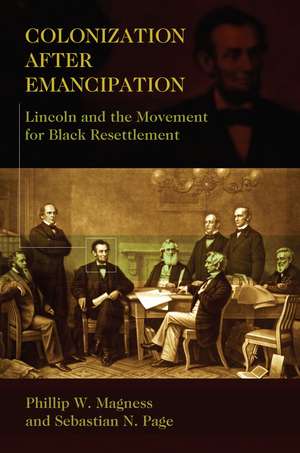Colonization After Emancipation: Lincoln and the Movement for Black Resettlement
Autor Phillip W. Magness, Sebastian N. Pageen Limba Engleză Hardback – 27 mar 2011 – vârsta ani
History has long acknowledged that President Abraham Lincoln, the Great Emancipator, had considered other approaches to rectifying the problem of slavery during his administration. Prior to Emancipation, Lincoln was a proponent of colonization: the idea of sending African American slaves to another land to live as free people. Lincoln supported resettlement schemes in Panama and Haiti early in his presidency and openly advocated the idea through the fall of 1862. But the bigoted, flawed concept of colonization never became a permanent fixture of U.S. policy, and by the time Lincoln had signed the Emancipation Proclamation on January 1, 1863, the word “colonization” had disappeared from his public lexicon. As such, history remembers Lincoln as having abandoned his support of colonization when he signed the proclamation. Documents exist, however, that tell another story.
Colonization after Emancipation: Lincoln and the Movement for Black Resettlement explores the previously unknown truth about Lincoln’s attitude toward colonization. Scholars Phillip W. Magness and Sebastian N. Page combed through extensive archival materials, finding evidence, particularly within British Colonial and Foreign Office documents, which exposes what history has neglected to reveal—that Lincoln continued to pursue colonization for close to a year after emancipation. Their research even shows that Lincoln may have been attempting to revive this policy at the time of his assassination.
Using long-forgotten records scattered across three continents—many of them untouched since the Civil War—the authors show that Lincoln continued his search for a freedmen’s colony much longer than previously thought. Colonization after Emancipation reveals Lincoln’s highly secretive negotiations with the British government to find suitable lands for colonization in the West Indies and depicts how the U.S. government worked with British agents and leaders in the free black community to recruit emigrants for the proposed colonies. The book shows that the scheme was never very popular within Lincoln’s administration and even became a subject of subversion when the president’s subordinates began battling for control over a lucrative “colonization fund” established by Congress.
Colonization after Emancipation reveals an unexplored chapter of the emancipation story. A valuable contribution to Lincoln studies and Civil War history, this book unearths the facts about an ill-fated project and illuminates just how complex, and even convoluted, Abraham Lincoln’s ideas about the end of slavery really were.
Preț: 330.98 lei
Nou
Puncte Express: 496
Preț estimativ în valută:
63.33€ • 66.13$ • 52.30£
63.33€ • 66.13$ • 52.30£
Carte tipărită la comandă
Livrare economică 15-29 aprilie
Preluare comenzi: 021 569.72.76
Specificații
ISBN-13: 9780826219091
ISBN-10: 0826219098
Pagini: 178
Ilustrații: 10 illus.
Dimensiuni: 152 x 229 x 20 mm
Greutate: 0.38 kg
Ediția:First Edition
Editura: University of Missouri Press
Colecția University of Missouri
ISBN-10: 0826219098
Pagini: 178
Ilustrații: 10 illus.
Dimensiuni: 152 x 229 x 20 mm
Greutate: 0.38 kg
Ediția:First Edition
Editura: University of Missouri Press
Colecția University of Missouri
Recenzii
“Provides a nuanced and fair account of Lincoln's struggle with race relations and colonization and adds to the ever-growing body of Lincoln scholarship.”—The Journal of Southern History
“The authors have done a fine job putting this tale together following an often-sketchy paper trail over three continents.”—Blue and Gray Magazine
“A first-rate, well-researched book. The authors have a very firm command of the literature and the complex primary sources surrounding this topic, and I was impressed with their ability to trace the sometimes labyrinthine course of colonization policy.”—Brian Dirck, author of Lincoln the Lawyer
“There is no doubt this book is going to attract a great deal of attention. Its strength lies in its nuanced analysis and the balanced conclusion it draws.”—R. J. M. Blackett, author of Divided Hearts: Britain and the American Civil War
Notă biografică
Phillip W. Magness is a lecturer in the School of Public Affairs at American University. Sebastian N. Page is Junior Research Fellow at Queens College, Oxford.
Descriere
Prior to Emancipation, President Abraham Lincoln was a proponent of colonization: the idea of sending African American slaves to another land to live as free people. This bookexplores the previously unknown truth about Lincoln’s attitude toward colonization and exposes what history has neglected to reveal—that Lincoln continued to pursue colonization for close to a year after emancipation. The authors’ research even shows that Lincoln may have been attempting to revive this policy at the time of his assassination.











